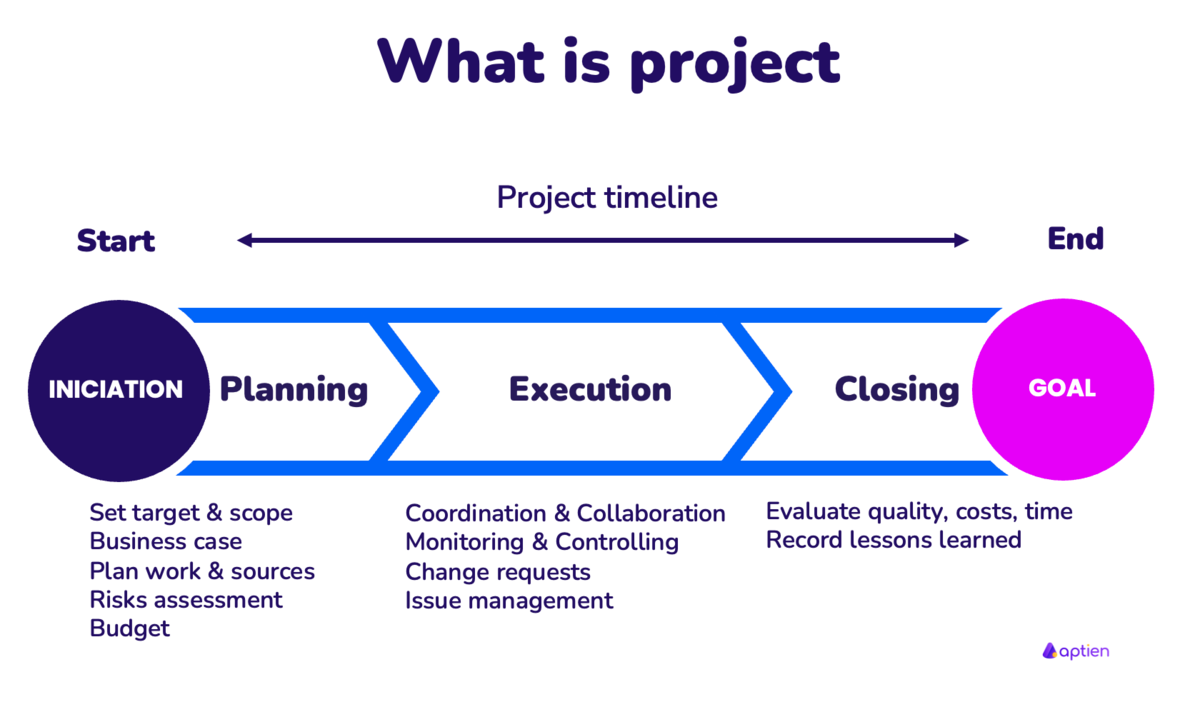Project Explained in One Simple Sentence
- A project is a temporary effort with a specific goal, a clear start and end date, designed to create a unique product, service, or outcome.
Understanding the Project for Small & Growing Businesses
Zakázka především v praxi znamená řízení úkolů, práce, materiálu a jejich koordinaci. Také znamená efektivní sdílení informací, abyste se neutopili v emailovém ping pongu. Zahrnuje tedy plánování, přidělování zdrojů, realizaci a sledování průběhu, aby byl úspěšně dokončen v požadovaném čase, s požadovanými náklady a požadovanou kvalitou výsledku. Zakázky jsou většinou pro zákazníky (například dodávka stavby, dodání produktu), ale mohou být i interní zlepšení (např. zavedení ISO, zavedení nového podnikového systému).
Key Characteristics of a Project
- Clear Goals and Deliverables – Goal-oriented initiative initiative with specific goals, tasks, and deadlines..
- Timeframe – A fixed start and end date with a clear project duration.
- Uniqueness – Each project is distinct, with specific tasks and activities that set it apart from routine operations.
- Budget - Defined financial resources allocated to cover costs and ensure the project stays within financial constraints
- Team Collaboration – Effective teamwork and communication among project members are essential.
- Project Management & Coordination – Often requires cross-functional collaboration within small, versatile teams (Project-Based Management).
Examples of Projects
- Delivering a customer order or contract
- Implementing an internal company initiative (e.g., introducing a new HR system)
- Constructing a building
Large and Small Projects
Project management varies depending on the size, complexity, and impact of the project.
Large Projects
- Long-term, often lasting months or years
- Complex planning and coordination required
- High resource and organizational demands
- Significant change management and impact assessment (BIA – Business Impact Analysis)
- Require detailed planning, structured project management, and collaboration across departments
- Examples: Company-wide system upgrades, construction of a new manufacturing facility
Small Projects and Assignments
- Shorter duration, typically lasting weeks or months
- Relatively simple with a limited scope
- Examples: Installation Projects, updating a specific part of a website, organizing a company event
How Aptien Helps with Project Management
Aptien provides a flexible and easy-to-use project management solution tailored for SMBs that need to manage projects without the complexity of large enterprise tools. It helps teams stay organized, track progress, and collaborate efficiently while integrating key business records.
Key Benefits of Using Aptien for Project Management
- All-in-One Project Organizer – coordinate all projects in one place, including tasks, documents, and deadlines.
- Task & Assignment Management – Assign tasks to team members, track deadlines, and monitor progress.
- Resource & Asset Tracking – Link assets, equipment, and documents to specific projects for better resource management.
- Collaboration & Communication – Centralized space for discussions, meeting minutes, and updates to keep everyone aligned.
- Customizable Workflow – Adapt project tracking to fit your business needs without rigid templates.
- Audit & Compliance Tracking – Ensure project documentation and compliance requirements are met effortlessly.
- Manage the project team including suppliers
How SMBs Use Aptien for Project Management
- Client Projects & Deliverables – Manage contracts, deadlines, and deliverables in one view.
- Internal Business Projects – Plan office renovations, system upgrades, or process improvements.
- Maintenance & Construction Projects – Track installations, inspections, and project timelines.
